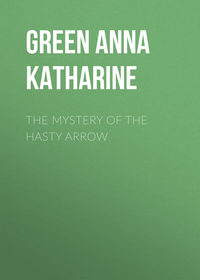
The Hermit Of. … Street
She broke into a laugh; I hear the sound now, an honest, amused and entirely reassuring laugh, that relieved me in one way and depressed me in another. “The idea! that house!” she cried. “I never thought you a girl to have nervous fancies. Why, it is the most matter-of-fact old mansion in the city. All its traditions are of the most respectable kind; no skeleton in those closets! By the way, my dear, has Mr. Allison shown you any of the curious old things those rooms must contain?”
I managed to stammer out a reply, “Mr. Allison does not consider that his rights extend so far. I have never crossed the drawing-room floor.”
“Well! that is carrying honor to an extreme. I am afraid I should not be able to suppress my curiosity to that extent. Is he afraid of the old lady returning unexpectedly and catching him?”
I could not echo her laugh; I could not even smile; I could only pucker up my brows as if angry.
“Everything is kept in shape, so that if she does return she will find the house comfortable,” I said; then, with a rising sense of having by this speech suggested a falsehood, I hastily dropped the topic, and, with an entire change of manner, remarked, airily:
“Mrs. Ransome must have gone off very suddenly, to leave everything so exposed in a house as splendid as that. Most people, however rich, see to their choice things more carefully.”
She rose to the bait. “Mrs. Ransome is a queer woman. Her things are of but little account to her; to save her daughter from a moment’s pain she would part with the house itself, let alone the accumulations it contains. That is why she left the country so suddenly.”
I waited a moment under the pretense of admiring a locket she wore, then I suggested, quietly:
“My husband told you that?”
The answer was as careless as the speaker.
“Oh, I don’t know who told me. It’s five years ago now, but every one at the time understood that she was angry, because some one mentioned blindness before her daughter. Mrs. Ransome had regarded it as a religious duty to raise her daughter in ignorance of her affliction. When she found she could not do so among her friends and acquaintances, she took her away to a strange land. It is the only tradition, which is not commonplace, which belongs to the family. Let us go up and see my new gowns. I have had two come home from Arnold’s since you went away.”
I thought the gowns would keep a minute longer. “Did Mrs. Ransome say good-by to her friends?” I asked. “Somehow this matter strikes me as being very romantic.”
“Oh, that shows what a puss you are. No, Mrs. Ransome did not say good-by to her friends, that is, not to us. She just went, leaving everything in your husband’s charge, who certainly has acquitted himself of the obligation most religiously. And now will you see the gowns?”
I tortured myself by submitting to this ordeal, then I ventured on another and entirely different attempt to clear up the mystery that was fast stifling out my youth, love and hope. I professed to have an extraordinary desire to see the city from the house-top. I had never been any higher up than the third story of any house I had been in, and could not, I told her, go any higher in the house in which I was then living. Might I go up on her roof? Her eyes opened, but she was of an amiable, inconsequent disposition and let me have my way without too much opposition. So, together with a maid she insisted upon sending with me, I made my way through the skylight on to the roof, and so into full view of the neighboring house-tops.
One glance at the spot I was most interested in, and I found myself too dizzy to look further. In the center of Mrs. Ransome’s roof there was to be seen what I can best describe as an extended cupola without windows. As there was no other break visible in the roof, the top of this must have held the skylight, which, being thus lifted many feet above the level of the garret floor, would admit air and light enough to the boarded-up space below, but would make any effort to be heard or seen, on the part of any one secreted there, quite ineffectual. One might, by a great effort, fling up a bead out of this funnel-shaped opening, but, even to my limited sense of mechanics, the chances seemed very unfavorable towards it doing much more than roll over the spacious roof into the huge gutters surrounding it.
Yet, if it chose to bound, it might clear the coping and fall, as one had fallen, on the devoted head of a person walking on the lawn below. All this I saw at a glance, and then, sick and dizzy, I crept back, and, with but little apology for my abruptness, took leave of Mrs. Vandyke and left the house.
The resolution I took in doing this was worthy of an older head and a more disciplined heart. By means that were fair, or by means that were foul, I meant to win my way into that boarded-up attic and see for myself if the words hidden away in my vinaigrette were true. To do this openly would cause a scandal I was yet too much under my husband’s influence to risk; while to do it secretly meant the obtaining of keys which I had every reason to believe he kept hidden about his person. How was I to obtain them? I saw no way, but that did not deter me from starting at once down town in the hope of being struck by some brilliant idea while waiting for him in his office.
Was it instinct that suggested this, or was the hand of Providence in all that I did at this time? I had no sooner seated myself in the little room, where I had been accustomed to wait for him, than I saw what sent the blood tingling to my finger-tips in sudden hope. It was my husband’s vest hanging in one corner, the vest he had worn down town that morning. The day was warm and he had taken it off. If the key should be in it!
I had never done a mean or underhanded thing before in my life, but I sprang at that vest without the least hesitation, and fingering it with the lightest of touches, found in the smallest of inside pockets a key, which instinct immediately told me was that of the door I had once endeavored to pass. Oh, the rush of feeling overwhelming me as I held it in my hand! Would he miss it if I carried it off? Would I be able to return to the house, see what I wanted to see, and get back in time to restore it before he wanted his vest? It was early yet, and he was very busy; I might succeed, and if I failed, and he detected his loss, why I alone would be the sufferer; and was I not a sufferer now? Dropping the key into my pocket, I went back into the outer room, and leaving word that I had remembered a little shopping which would take me again up town, I left the building and returned to – Street. My emotions were indescribable, but I preserved as sedate an appearance as possible, and was able to account for my return in a natural enough way to Ambrose when he opened the door for me. To brave his possible curiosity by going up-stairs, required a still greater effort; but the thought that my intentions were pure and my daring legitimate, sustained me in the ordeal, and I ran, singing, up the first flight, glad that Ambrose had no better ear for music than to be pleased with what he probably considered an evidence of happiness on the part of his young mistress.
I was out of breath with suspense, as well as with my rapid movements, when I reached the shut-in staircase and carefully unlocked its narrow door. But by the time I had reached the fourth floor, and unlocked, with the same key, the only other door that had a streak of light under it, I had gained a certain degree of tense composure born of the desperate nature of the occasion. The calmness with which I pushed open the door proved this—a calmness which made the movement noiseless, which was the reason, I suppose, why I was enabled to suppress the shriek that rose to my lips as I saw that the room had occupants, and that my worst fears were thus realized.
A woman was sitting, with her back to me, at a table, and before her, with her face turned my way, was a young girl in whom, even at first glance, I detected some likeness to myself. Was this why Mr. Allison’s countenance expressed so much agitation when he first saw me? The next moment this latter lifted her head and looked directly at me, but with no change in her mobile features; at which token of blindness I almost fell on my knees, so conclusively did it prove that I was really looking upon Mrs. Ransome and her daughter.
The mother, who had been directing her daughter’s hands in some needlework, felt that the latter’s attention had been diverted.
“What is it, dear?” she asked, with an indescribable mellowness of voice, whose tone thrilled me with a fresh and passionate pity.
“I thought I heard Mr. Allison come in, but he always knocks; besides, it is not time for him yet.” And she sighed.
That sigh went through my heart, rousing new feelings and deeper terrors; but I had no time to indulge in them, for the mother turned at the gasp which left my lips, and rising up, confronted me with an amazement which left her without any ability to speak.
“Who is it, mother?” inquired the blind girl, herself rising and beaming upon me with the sweetest of looks.
“Let me answer,” I ventured, softly. “I am Mr. Allison’s wife. I have come to see if there is anything I can do to make your stay here more comfortable.”
The look that passed over the mother’s face warned me to venture no further in the daughter’s presence. Whatever that mother had suffered, the daughter had experienced nothing but satisfied love and companionship in these narrow precincts. Her rounded cheeks showed this, and the indescribable atmosphere of peace and gladness which surrounded her. As I saw this, and realized the mother’s life and the self-restraint which had enabled her to accept the inevitable without raising a complaint calculated to betray to the daughter that all was not as it should be with them, I felt such a rush of awe sweep over me that some of my fathomless emotion showed in my face; for Mrs. Ransome’s own countenance assumed a milder look, and advancing nearer, she pointed out a room where we could speak apart. As I moved towards it she whispered a few words in her daughter’s ear, then she rejoined me.
“I did not know Mr. Allison was married,” were her first words.
“Madame,” said I, “I did not know we were the guests of a lady who chooses to live in retirement.” And opening my vinaigrette, I took out the bead and the little note which had enwrapped it. “This was my first warning that my husband was not what I had been led to consider him,” I murmured. “Mrs. Ransome, I am in need of almost as much pity as yourself. I have been married just six days.”
She gave a cry, looked me wildly in the face, and then sank upon her knees, lifting up thanks to heaven. “Twenty-four of these notes,” said she; “have I written, and flung upward through that lofty skylight, weighted by the beads he left wound about my darling daughter’s neck. This one only has brought me the least response. Does he know? Is he willing that you should come up here?”
“I have come at the risk of my life,” I quietly answered. “He does not know that I have surprised his secret. He would kill me if he did. Madame, I want to free you, but I want to do it without endangering him. I am his wife, and three hours ago I loved him.”
Her face, which had turned very pale, approached mine with a look I hardly expected to encounter there. “I understand,” she said; “I comprehend devotion; I have felt it for my daughter. Else I could not have survived the wrong of this incarceration, and my forcible severance from old associations and friends. I loved her, and since the knowledge of her affliction, and the still worse knowledge that she had been made the victim of a man’s greed to an extent not often surpassed in this world, would have made her young life wretched without securing the least alleviation to our fate, I have kept both facts from her, and she does not know that closed doors mean bondage any more than she knows that unrelieved darkness means blindness. She is absolutely ignorant that there is such a thing as light.”
“Oh, madame!” I murmured, “Oh, madame! Show a poor girl what she can do to restore you to your rights. The door is open and you can descend; but that means– Oh, madame, I am filled with terror when I think what. He may be in the hall now. He may have missed the key and returned. If only you were out of the house!”
“My dear girl,” she quietly replied, “we will be some day. You will see to that, I know. I do not think I could stay here, now that I have seen another face than his. But I do not want to go now, to-day. I want to prepare Theresa for freedom; she has lived so long quietly with me that I dread the shock and excitement of other voices and the pressure of city sounds upon her delicate ears. I must train her for contact with the world. But you won’t forget me if I allow you to lock us in again? You will come back and open the doors, and let me go down again through my old halls into the room where my husband died; and if Mr. Allison objects– My dear girl, you know now that he is an unscrupulous man, that it is my money he begrudged me, and that he has used it and made himself a rich man. But he has one spark of grace in him. He has never forgotten that we needed bread and clothes. He has waited on us himself, and never have we suffered from physical want. Therefore, he may not object now. He may feel that he has enriched himself sufficiently to let us go free, and if I must give my oath to let the past go without explanation, why I am ready, my dear; nothing can undo it now, and I am grown too old to want money except for her.” “I cannot,” I murmured, “I cannot find courage to present the subject to him so. I do not know my husband’s mind. It is a fathomless abyss to me. Let me think of some other way. Oh, madam! if you were out of the house, and could then come–” Suddenly a thought struck me. “I can do it; I see the way to do it—a way that will place you in a triumphant position, and yet save him from suspicion. He is weary of this care. He wants to be relieved of the dreadful secret which anchors him to this house, and makes a hell of the very spot in which he has fixed his love. Shall we undertake to do his for him? Can you trust me if I promise to take an immediate impression of this key, and have one made for myself, which shall insure my return here?”
“My dear,” she said, taking my head between her two trembling hands, “I have never looked upon a sweeter face than my daughter’s till I looked upon yours to-day. If you bid me hope, I will hope, and if you bid me trust, I will trust. The remembrance of this kiss will not let you forget.” And she embraced me in a warm and tender manner.
“I will write you,” I murmured. “Some day look for a billet under the door. It will tell you what to do; now I must go back to my husband.”
And, with a sudden access of fear, caused by my dread of meeting his eyes with this hidden knowledge between us, I hastened out and locked the door behind me.
When I reached the office, I was in a fainting condition, but all my hopes revived again when I saw the vest still hanging where I had left it, and heard my husband’s voice singing cheerfully in the adjoining room.
CHAPTER VI. WHILE OTHERS DANCED
I CANNOT enter into the feelings of this dreadful time. I do not know if I loved or hated the man I had undertaken to save. I only know I was determined to bring light out of darkness in a way that would compromise nobody, possibly not even myself. But to do this I must dazzle him into giving me a great pleasure. A crowd in the – Street house was necessary to the quiet escape of Mrs. Ransome and her daughter; so a crowd we must have, and how have a crowd without giving a grand party? I knew that this would be a shocking proposition to him, but I was prepared to meet all objections; and when, with every nerve alert and every charm exerted to its utmost, I sat down at his side that evening to plead my cause, I knew by the sparkle of his eye and the softening of the bitter lines that sometimes hardened his mouth, that the battle was half won before I spoke, and that I should have my party whatever it might cost him in mental stress and worry.
Perhaps he was glad to find me given over to folly at a time when he was waiting for a miracle to release him from the net of crime in which he had involved himself; perhaps he merely thought it would please me, and aid him to thus strengthen our position in the social world before taking our flight to a foreign land; but whatever lay at the bottom of his amenity, he gave me carte blanche that night for an entertainment that should embrace all his friends and mine and some of Mrs. Vandyke’s. So I saw that doubt removed.
The next thing I did was to procure a facsimile of his key from the wax impression I had taken of it in accordance with my promise to Mrs. Ransome. Then I wrote her a letter, in which I gave her the minutest directions as to her own movements on that important evening. After which I gave myself up entirely to the business of the party. Certain things I had insisted on. All the rooms were to be opened, even those on the third floor; and I was to have a band to play in the hall. He did not deny me anything. I think his judgment was asleep, or else he was so taken up with the horrible problem presented by his desire to leave the city and the existence of those obligations which made departure an impossibility, that he failed to place due stress on matters which, at another time, might very well seem to threaten the disclosure of his dangerous secret.
At last the night came.
An entertainment given in this great house had aroused much interest. Most of our invitations had been accepted, and the affair promised to be brilliant. As a bride, I wore white, and when, at the moment of going downstairs, my husband suddenly clasped about my neck a rich necklace of diamonds, I was seized by such a bitter sense of the contrast between appearances and the awful reality underlying these festivities, that I reeled in his arms, and had to employ all the arts which my dangerous position had taught me, to quiet his alarm, and convince him that my emotion sprang entirely from pleasure.
Meantime the band was playing and the carriages were rolling up in front. What he thought as the music filled the house and rose in piercing melody to the very roof, I cannot say. I thought how it was a message of release to those weary and abused ones above; and, filled with the sense of support which the presence of so many people in the house gave me, I drew up my girlish figure in glad excitement and prepared myself for the ordeal, visible and invisible, which awaited me.
The next two hours form a blank in my memory. Standing under Mrs. Ransome’s picture (I would stand there), I received the congratulations of the hundred or more people who were anxious to see Mr. Allison’s bride, and of the whole glittering pageant I remember only the whispered words of Mrs. Vandyke as she passed with the rest: “My dear, I take back what I said the other day about the effect of marriage upon you. You are the most brilliant woman here, and Mr. Allison the happiest of men.” This was an indication that all was going well. But what of the awful morning-hour that awaited us! Would that show him a happy man?
At last our guests were assembled, and I had an instant to myself. Murmuring a prayer for courage, I slid from the room and ran up-stairs. Here all was bustle also—a bustle I delighted in, for, with so many people moving about, Mrs. Ransome and her daughter could pass out without attracting more than a momentary attention. Securing a bundle I had myself prepared, I glided up the second staircase, and, after a moment’s delay, succeeded in unlocking the door and disappearing with my bundle into the fourth story. When I came down, the key I had carried up was left behind me. The way for Mrs. Ransome’s escape lay open.
I do not think I had been gone ten minutes from the drawing-room. When I returned there, it was to find the festivities at their height, and my husband just on the point of missing me. The look which he directed to-wards me pierced me to the heart; not that I was playing him false, for I was risking life, love and the loss of everything I prized, to save him from himself; but that his love for me should be so strong he could forget the two tortured hearts above, in the admiration I had awakened in the shallow people about us. But I smiled, as a woman on the rack might smile if the safety of her loved ones depended on her courage, and, nerving myself for the suspense of such a waiting as few of my inexperience have ever been called upon to endure, I turned to a group of ladies I saw near me and began to talk.
Happily, I did not have to chatter long; happily, Mrs. Ransome was quick in her movements and exact in all she did, and, sooner than I expected, sooner, perhaps, than I was prepared for it, the man who attended the front door came to my side and informed me that a lady wished to see me—a lady who had just arrived from the steamer, and who said she was the mistress of the house, Mrs. Ransome.
Mrs. Ransome! The name spread like wildfire, but before any movement was made, I had bounded, in laughing confusion, to my husband’s side, and, grasping him merrily by the arm, cried:
“Your expectations have come true. Mrs. Ransome has returned without warning, and tonight she will partake of the supper you have always had served for her.”
The shock was as great, perhaps, as ever man received. I knew what it was likely to be, and held him upright, with the seeming merriment in my eyes which I did not allow to stray from his. He thought I was mad, then he thought he was—then I recalled him to the dangers and exigencies of the moment by saying, with forced naïveté: “Shall I go and welcome her to this gathering in her own house, or will you do the honors? She may not know me.”
He moved, but as a statue might move, shot through and through with an electric spark. I saw that I must act, rather than he, so uttering some girlish sentence about the mice and cat, I glided away into the hall, where Mrs. Ransome stood in the nondescript black cloak and bonnet I had provided her from her own wardrobe. She had slipped a few moments before from the house with her daughter, whom she had placed in a carriage, which I had ordered to wait for them directly in front of the lamppost, and had now re-entered as the mistress returning unexpectedly after a departure of five years. All had been done as I had planned, and it only remained to carry on the farce and prevent its developing into a tragedy.
Rushing up to her, I told her who I was, and, as we were literally surrounded in a moment, added such apologies for the merrymaking in which she found us indulging as my wit suggested and the occasion seemed to demand. Then I allowed her to speak. Instantly she was the mistress of the house. Old-fashioned as her dress was, and changed as her figure must have been, she had that imposing bearing which great misfortune, nobly borne, gives to some natures, and feeling the eyes of many of her old friends upon her, she graciously smiled and said that she was delighted to receive so public a welcome. Then she took me by the hand.
“Do not worry, child,” she said, “I have a daughter about your age, which in itself would make me lenient towards one so young and pretty. Where is your husband, dear? He has served me well in my absence, and I should like to shake hands with him before I withdraw with my daughter, to a hotel for the night.”
I looked up; he was standing in the open doorway leading into the drawing-room. He had recovered a semblance of composure, but the hand fingering the inner pocket, where he kept his keys, showed in what a tumult of surprise and doubt he had been thrown by this unaccountable appearance of his prisoner in the open hall; and if to other eyes he showed no more than the natural confusion of the moment, to me he had the look of a secretly desperate man, alive to his danger, and only holding himself in check in order to measure it.
At the mention she made of his name, he came mechanically forward, and, taking her proffered hand, bowed over it. “Welcome.” he murmured, in strained tones; then, startled by the pressure of her fingers on his, he glanced doubtfully up while she said:
“We will have no talk to-night, my faithful and careful friend, but to-morrow you may come and see me at the Fifth Avenue. You will find that my return will not lessen your manifest happiness.” Then, as he began to tremble, she laid her hand on his arm, and I heard her smilingly whisper: “You have too pretty a wife for me not to wish my return to be a benefaction to her.” And, with a smile to the crowd and an admonition to those about her not to let the little bride suffer from this interruption, she disappeared through the great front door on the arm of the man who for five years had held her prisoner in her own house. I went back into the drawing-room, and the five minutes which elapsed between that moment and that of his return were the most awful of my life. When he came back I had aged ten years, yet all that time I was laughing and talking.










